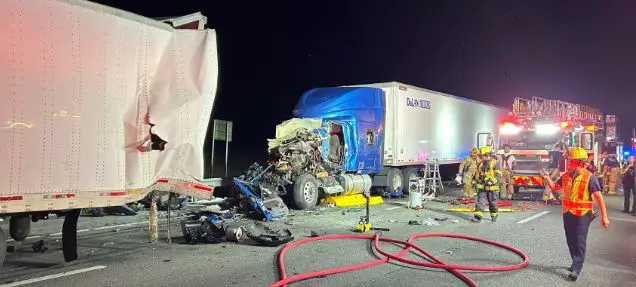Truck accidents are often devastating and can result in life-changing injuries, long-term disabilities, or even fatalities. Driver negligence is the primary cause of truck accidents in the United States. A recent Federal Motor Carrier Safety Administration (FMCSA) report revealed that driver error is ten times more likely to contribute to a severe truck accident than any other factor, including weather, road conditions, and vehicle performance. Interstate commerce between Florida and other states is governed by federal law, specifically outlined in Title 49 of the Code of Federal Regulations. These regulations impose specific operational requirements on trucking companies, drivers, and owners. Furthermore, the U.S. Department of Transportation (DOT), the Federal Motor Carrier Safety Administration (FMCSA), and the Florida Department of Transportation (FDOT) enforce additional regulations to ensure the safety and regulation of the commercial trucking industry.
When someone is involved in a truck accident that was not their fault, they are entitled to seek compensation from the responsible parties. However, it is essential to remember that truck accident claims require extensive evidence collection to prove liability.
If you happen to live in Tampa and are involved in a truck accident, you must consult an experienced Tampa truck accident attorney. They will help guide you and obtain justice and fair compensation. In this article, we will discuss how to collect crucial evidence for your truck accident claim.
Preserve the Accident Scene
Preserving the accident scene should be your top priority after a truck accident. If you’re physically able, move yourself and any other parties involved out of harm’s way or signal them to avoid further collisions. Once everyone’s safety has been ensured, document where all vehicles came to rest and where any wheel marks may have been left behind at the scene.
It is also essential to secure any witnesses’ contact information – names and phone numbers if possible – as soon as possible before they leave the area since they could provide valuable testimony later in court proceedings.
Gather Relevant Documents
There are several documents you should obtain following a truck incident; police reports, medical records, insurance policies for all drivers involved (including commercial carrier policies), vehicle registrations (license plates), and cell phone records from other motorists who may have seen what happened while driving past or stopped at red lights close enough within hearing range of the impact sound(s). Obtaining these documents immediately following an incident and preserving them safely with clear annotations of what type of document each one contains, along with dates attached, makes providing accurate information much easier when pursuing a settlement claim later on.
Have an Experienced Truck Accident Attorney Investigate
Taking on a trucking company solo without an attorney’s help is not a wise decision. You may believe doing so will save you money. However, it’s always best to first consult with an experienced truck accident attorney. This ensures critical evidence is collected for your case. Professional attorneys know which documents need to be gathered and preserved for an effective trial.
An attorney can also access the internal policies of the truck company involved in the accident, including driver training records, journey logs, employee files, and equipment inspection reports. These items are essential for proving negligence on behalf of a truck driver or carrier company.
Vehicle Data Recorders
One crucial piece of evidence that can’t be ignored during an investigation into a truck accident is data from vehicle data recorders (VDRs), sometimes referred to as “black boxes.” VDRs store valuable information about various aspects of a commercial truck’s operation at high levels–including driving speed and total hours of operation.
This data can provide insights into a range of factors that might have contributed to an accident–including whether the driver violated any federal or state regulations by failing to take mandatory break periods. An expert in heavy-truck engineering could cross-examine this type of evidence during deposition proceedings if there was any doubt about its accuracy or interpretation later down the line.
Physical Evidence
In court proceedings, there are significant physical evidence elements that can be utilized to support your case. These include capturing photographic evidence of damage marks left on vehicles following a collision. It is crucial to promptly take pictures of the accident scene before witnesses disperse. Additionally, broken vehicle parts and skid marks or debris located near the edges of the roadway can serve as valuable evidence, indicating the impact forces when trucks unexpectedly veer off-course.
Medical Records
Subsequently, it will be essential to collect medical records from individuals who have suffered injuries, along with detailed descriptions outlining the physical pain and other symptoms experienced by each victim. These descriptions should include information on the cause(s) and location(s) of the injury(ies) if known, the expected timeline for recovery, any recommendations provided by doctors, prescribed treatment plans, and specific diagnoses given. Such comprehensive documentation serves the purpose of preserving a clear and accurate account, eliminating guesswork, and facilitating the process of piecing together fragmented facts when pursuing compensation claims for challenging tasks.
In Closing
Gathering evidence can present challenges, especially when dealing with truck accidents. It is crucial to give priority to preserving witness details, obtaining pertinent medical records related to the sustained injuries, and documenting the physical damage caused. Additionally, reaching out to competent truck accident attorneys is essential as they can facilitate the utilization of this evidence during the investigation process. Such investigations aim to secure compensation for individuals affected by severe losses resulting from traumatic incidents involving truck collisions.






